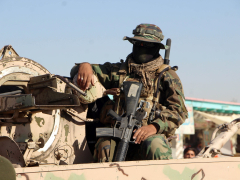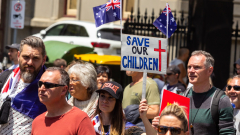Pakistan and Afghanistan have agreed to an “immediate ceasefire” after a week of deadly clashes along their border, as the ties between the two South Asian neighbours plunged to their lowest point since the Taliban returned to power in 2021.
Both countries agreed to stop fighting and work towards “lasting peace and stability” after peace talks in Doha, the Qatari Ministry of Foreign Affairs said on Sunday, about the deal it mediated alongside Turkiye.
Recommended Stories
list of 4 items
- list 1 of 4‘New Normal’: Is Pakistan trying to set new red lines with Afghan Taliban?
- list 2 of 4Analysis: Why Pakistan and the Taliban won’t find it easy to patch up
- list 3 of 4UN urges ‘lasting’ ceasefire after Pakistan-Afghanistan clashes kill dozens
- list 4 of 4Afghanistan, Pakistan agree to immediate ceasefire after talks in Doha
end of list
Dozens of people have been killed and hundreds wounded in the worst bout of violence in recent years. The violence erupted on October 11 at multiple fronts along their 2,600km (1,600-mile) border, after Islamabad allegedly carried out strikes in Kabul and the southeastern province of Paktika against what it said were armed groups linked to attacks inside Pakistan.
So, what do we know about the truce agreement and what might come next?
What do we know about the ceasefire?
After a round of negotiations between Pakistan and Afghanistan in the Qatari capital, Doha, “the two sides agreed to an immediate ceasefire and the establishment of mechanisms to consolidate lasting peace and stability between the two countries,” Qatar’s Foreign Ministry announced in a statement.
“The two parties also agreed to hold follow-up meetings in the coming days to ensure the sustainability of the ceasefire and verify its implementation in a reliable and sustainable manner, thus contributing to achieving security and stability in both countries,” the statement added.
Following the Qatari ministry’s statement, Pakistan’s Defence Minister Khawaja Asif posted confirmation of the deal on X.
“Cross-border terrorism from Afghan territory will cease immediately,” Asif wrote. “Both countries will respect each other’s sovereignty and territorial integrity.”
Asif further confirmed a “follow-up meeting between the delegations is scheduled to take place in the Turkish city of Istanbul on October 25 to discuss the matters in detail.”

Pakistan’s Deputy Prime Minister and Foreign Minister Ishaq Dar said the truce was “the first step in the right direction”.
“We look forward to the establishment of a concrete and verifiable monitoring mechanism, in the next meeting to be hosted by Turkiye, to address the menace of terrorism emanating from Afghan soil towards Pakistan. It is important to put all efforts in place to prevent any further loss of lives,” he posted on X.
Zabihullah Mujahid, the Taliban spokesperson, said that under the terms of the agreement, “both sides reaffirm their commitment to peace, mutual respect, and the maintenance of strong and constructive neighbourly relations.
“Both sides are committed to resolving issues and disputes through dialogue,” Mujahid said in a post on X. “It has been decided that neither country will undertake any hostile actions against the other, nor will they support groups carrying out attacks against the Government of Pakistan.”
Mujahid said the countries have agreed on refraining “from targeting each other’s security forces, civilians, or critical infrastructure”.
Mujahid, as well as Dar and Asif, thanked Qatar and Turkiye for their role in facilitating the talks that led to the ceasefire.
Elizabeth Threlkeld, Senior fellow and director of the South Asia Program at the Stimson Center, said she was skeptical about the durability of the ceasefire.
“There are multiple actors in the scenario. The TTP and other groups aligned with it are not party to these talks [in Doha]. So they are not necessarily subject to the agreement,” she told Al Jazeera.
“So, the onus falls on the Afghan Taliban to take action and curtail their activities. That’s going to be extremely challenging due to the incredibly porous border. Even with Pakistan’s efforts to put up fencing, it’s really difficult to have capacity and manpower to be able to shut down these sorts of infiltrations.
“It will be challenging for the Taliban to rein in the TTP, assuming that they have the best of intentions,” Threlkeld added.
Why Pakistan has blamed the Taliban for attacks inside its territory?
Pakistan wants the Taliban to rein in armed groups such as the Taliban Pakistan, known by the acronym TTP, and others blamed for carrying out attacks on its territory. Armed attacks by TTP rebels and the Balochistan Liberation Army (BLA), which operates in the resource-rich Balochistan province, have surged in recent years, with 2025 on track to become the deadliest year.
Khyber Pakhtunkhwa and Balochistan, which border Afghanistan, have borne the brunt of the violence.
At least 2,414 deaths have been recorded in the first three quarters of this year, according to the Center f





